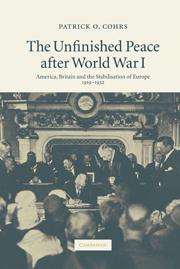Book contents
- Frontmatter
- Contents
- Acknowledgements
- List of abbreviations
- A note on the footnotes and bibliography
- Introduction
- Prologue
- 1 The wider challenges
- 2 Wilson, Lloyd George and the quest for a ‘peace to end all wars’
- 3 The ill-founded peace of 1919
- 4 The escalation of Europe's post-Versailles crisis, 1920–1923
- Part I The Anglo-American stabilisation of Europe, 1923–1924
- Part II Europe's nascent Pax Anglo-Americana, 1924–1925
- Part III The unfinished transatlantic peace order: the system of London and Locarno, 1926–1929
- 17 Sustaining stability, legitimating peaceful change
- 18 Progressive visions and limited commitments
- 19 ‘Reciprocity’?
- 20 The new European concert – and its limits
- 21 Thoiry – the failed quest for a ‘final postwar agreement’
- 22 Towards peaceful change in eastern Europe?
- 23 Achievements and constraints
- 24 No ‘new world order’
- 25 The initiation of the Young process
- 26 The last ‘grand bargain’ after World War I
- Epilogue
- Conclusion
- Map: Post-World War I Europe after the peace settlement of Versailles
- Bibliography
- Index
18 - Progressive visions and limited commitments
American stabilisation efforts in the era of London and Locarno
Published online by Cambridge University Press: 21 July 2009
- Frontmatter
- Contents
- Acknowledgements
- List of abbreviations
- A note on the footnotes and bibliography
- Introduction
- Prologue
- 1 The wider challenges
- 2 Wilson, Lloyd George and the quest for a ‘peace to end all wars’
- 3 The ill-founded peace of 1919
- 4 The escalation of Europe's post-Versailles crisis, 1920–1923
- Part I The Anglo-American stabilisation of Europe, 1923–1924
- Part II Europe's nascent Pax Anglo-Americana, 1924–1925
- Part III The unfinished transatlantic peace order: the system of London and Locarno, 1926–1929
- 17 Sustaining stability, legitimating peaceful change
- 18 Progressive visions and limited commitments
- 19 ‘Reciprocity’?
- 20 The new European concert – and its limits
- 21 Thoiry – the failed quest for a ‘final postwar agreement’
- 22 Towards peaceful change in eastern Europe?
- 23 Achievements and constraints
- 24 No ‘new world order’
- 25 The initiation of the Young process
- 26 The last ‘grand bargain’ after World War I
- Epilogue
- Conclusion
- Map: Post-World War I Europe after the peace settlement of Versailles
- Bibliography
- Index
Summary
Undoubtedly, if any power then the United States had the resources to play a leading role in buttressing European security and the continent's further political and financial stabilisation in the latter half of the 1920s. The critical years following the nadir of the Ruhr crisis had shown that as a rising, financially dominating world power distanced from old European rivalries and competition America was in an ideal position to take on a more extensive mediating role in the Franco-German dispute – in some ways in a better position than Britain. More precisely, however, though America retained a critical role in the postwar international system, it was still hardly suited, and prepared, to reach beyond the limited role that Hughes had defined and fulfilled in 1924; for US policymaking remained constrained not only by prevailing domestic isolationism but also by foreign-policy traditions, and premises, that were only slowly adapted to the new reach of American power after the Great War. Nevertheless, each on their terms, French and German leaders continued to seek wider US engagement in Europe, be it to impede further alterations of the status quo or to accelerate peaceful change wherever possible. Mutatis mutandis, the same held true for Polish and Czechoslovak policymakers.
Crucially, apart from Britain's Locarno guarantees only broader American security commitments could reassure France and its eastern alliance partners further, even if these commitments fell short of full alliance guarantees, which the US Congress would never have sanctioned after the ‘treaty fight’ following Versailles.
- Type
- Chapter
- Information
- The Unfinished Peace after World War IAmerica, Britain and the Stabilisation of Europe, 1919–1932, pp. 296 - 324Publisher: Cambridge University PressPrint publication year: 2006



